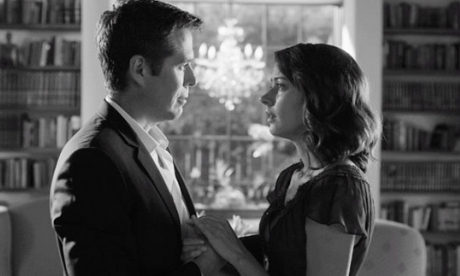Director: Joss Whedon
Writer: Joss Whedon, William Shakespeare (play)
Year: 2012
Cast: Amy Acker, Alexis Denisof, Fran Kranz
★★★★★
Filmmakers have always had a tendency to take Shakespeare very seriously indeed, diving deep into the texts to develop their own intellectual interpretations or contriving new settings and scenarios to make the plays appear more relevant to modern audiences. This can result in rich, thoughtful pieces of cinema – see Branagh at his best – or wild strokes of genius, like Baz Luhrmann’s Romeo + Juliet, but, when done badly, Shakespeare translates awkwardly to screen; there is often some disparity between the language and the action, a fatal flaw that forces you to suspend your disbelief.

Joss Whedon’s Much Ado About Nothing is a triumph because it avoids all the usual trappings, taking the text at face value and letting it largely speak for itself. Filmed over 12 days at the director’s Santa Monica home, on a scheduled break from the production of Avengers Assemble, it is a refreshingly straightforward adaptation, modernised due to practical necessity rather than any conceit, dramatic and comedic without ever feeling forced.
Whedon makes excellent use of his surroundings, exploiting the theatricality of the open plan interiors and utilising every layer of the impressive grounds. The film is shot in monochrome, at least partly to ensure greater consistency with limited resources, but this adds an element of noir-ish glamour to the overall look and conceals anything in the environment that might otherwise have been visually distracting. The modernisation is handled deftly, using things like smartphones and electric torches when necessary, without ever making them seem incongruous to the script.
The film plays out like an extended party; the characters are continually drinking wine and engaging in one festivity or another, with Whedon’s own light jazz score providing the soundtrack. It begins as a homecoming, with Benedick (Alexis Denisof) and Claudio (Fran Kranz) returning from war, accompanied by the villainous Don John (Sean Maher) and his two associates. Claudio is instantly infatuated with the beautiful, virtuous Hero (Jillian Morgese), while Benedick renews his prickly relationship with her sister, Beatrice (Amy Acker), which Whedon embellishes by revealing in flashback that they once had a passionate one night stand. Claudio quickly wins Hero’s hand in marriage and, along with his friend, Don Pedro (Reed Diamond), and her father, Leonato (Clark Gregg), they vow to play Cupid with Beatrice and Benedick, while their enemies conspire to break up the happy couple.

Much Ado About Nothing never shies away from turning dark and moody, particularly when the drama reaches its peak, but it will be remembered primarily as one of the funniest Shakespeare adaptations ever committed to film. The exchanges between Benedick and Beatrice are brilliantly timed and accentuate the biting wit of the original dialogue, while the slapstick scenes in which they are allowed to hear of their supposed love for one another are inventive and genuinely hilarious. Nathan Fillion gives an inspired performance as the easily-offended police officer, Dogsberry, playing the clown with relentless sincerity, and the entire cast go about their work in such good humour that it is difficult not to be drawn along with them.
It is a evidently personal project for Whedon and he is working with actors who are behind him every step of the way. The film has a spontaneous, liberated quality, stemming from the natural intimacy between the cast, which helps the audience connect with the language and engage emotionally with the characters. Like no other adaptation of a Shakespeare comedy, it fully understands the playfulness of the dialogue, the sheer foolish joy of the language, without coming close to overstating it. Never seriously putting a foot wrong, Much Ado About Nothing really is a delight.